
State history journals can be a treasure trove of useful information for family historians and local history enthusiasts alike. Many state historical societies included a journal focusing on the early history of their region among their earliest offerings to members and scholars. In addition to articles on a wide array of topics, most of these publications also reported on recent acquisitions, “queries and questions” pieces, and transcriptions of manuscripts in their collections. Early print indexes to these magazines leave a great deal to be desired for the family history detective, often limiting their efforts to article authors, titles and main subjects. Keyword searching was not even a light in the editor’s eye.![]()
Spring forward to the present and the research public has many options for gaining access to the amazing content in these publications. Some have been digitized and made accessible through Google Books and the Internet Archive. Other institutions have worked with online publishers to digitize their entire archive and provide access. This article will explore one of those online publishers, JSTOR, from the perspective of the Register of the Kentucky Historical Society.
The Register of the Kentucky Historical Society has been published since 1903 and includes many of the article types discussed above. For example, the first issue in 1903 included the following:
- Front Matter
- A New Light on Daniel Boone’s Ancestry
- Kentucky’s First Railroad, which was the First One West of the Alleghany Mountains
- Fort Hill
- Address of Hon. John A. Steele, Vice-President, before Kentucky Historical Society, Feb. 11, 1899

- Before Unpublished Copy of a Letter from Gen. Ben Logan to Governor Isaac Shelby
- Counties in Kentucky and Origin of their Names
- Paragraphs
- The Kentucky River and Its Islands
- DEPARTMENT OF GENEALOGY AND HISTORY entries on Averill, Bibb, Crockett, Dudley, Reunion of the Alves Tribe
- BOOK AND MAGAZINE NOTICES
- Fine Showing of State Finances
- REPORTS FROM The Kentucky State Historical Society, From Its Reorganization, October 6, 1896, To October 4, 1902
Any researcher can find their way into most any library in Kentucky to use the print version of the Register. Most are dissuaded from doing so by the cumbersome volume indexes and the lack of a comprehensive index to more than just the authors and titles of articles. However, all researchers have access to this publication through JSTOR.  If you have never used JSTOR to find articles, you are missing out on a wonderful resource. JSTOR is a commercial online publisher which has literally thousands of titles in its holdings, originally designed to be a storehouse of academic journals – just think – “Journal Storage” or JSTOR. Your local library may subscribe, which will mean that you have access to all these holdings. Most college and universities subscribe to JSTOR, as well. If the library nearest you does not subscribe you still have options. You can subscribe for free, as an individual. Your subscription will be limited to a certain number of titles, but you can add titles and delete titles as your research needs designate. With some titles, your article access may only permit a few per month, but don’t let this discourage you – the access is worth delay!
If you have never used JSTOR to find articles, you are missing out on a wonderful resource. JSTOR is a commercial online publisher which has literally thousands of titles in its holdings, originally designed to be a storehouse of academic journals – just think – “Journal Storage” or JSTOR. Your local library may subscribe, which will mean that you have access to all these holdings. Most college and universities subscribe to JSTOR, as well. If the library nearest you does not subscribe you still have options. You can subscribe for free, as an individual. Your subscription will be limited to a certain number of titles, but you can add titles and delete titles as your research needs designate. With some titles, your article access may only permit a few per month, but don’t let this discourage you – the access is worth delay!
 To subscribe to JSTOR, go to http://www.jstor.org/ . On the Home page you will see the navigational tabs and the main search box. First you will need to establish a login and profile. Then you can explore. As with most login functions, you will need to create a profile, a user name and password. This is not a high security site, so you don’t need to pick a super secure password; make it one you will remember. This information also gives JSTOR some basics on its user base, so make sure you tell them what state you live in, etc.
To subscribe to JSTOR, go to http://www.jstor.org/ . On the Home page you will see the navigational tabs and the main search box. First you will need to establish a login and profile. Then you can explore. As with most login functions, you will need to create a profile, a user name and password. This is not a high security site, so you don’t need to pick a super secure password; make it one you will remember. This information also gives JSTOR some basics on its user base, so make sure you tell them what state you live in, etc.
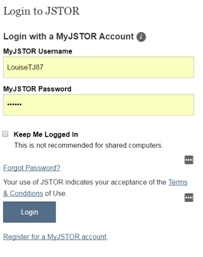
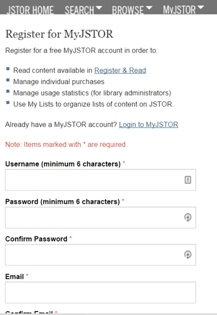
It’s really that easy. Now you are ready to explore. Once you return to the Homepage, you can see the navigation buttons along the top of the page. The Search tab is pretty straightforward.
 The Browse tab lets you zero in on the exact title you are seeking, or go directly to the institutional publisher. In this case you can use the Publisher search to find the Kentucky Historical Society and see the title associated with KHS. Many long-published state history journals have changed their names (most have been in print for over 100 years, so this is not surprising.) The Register has had just such a title change, and even though it appears minute to us, from JSTOR’s point of view it is CHANGE. Thus the two different choices (1903-1946 and 1947-2012). There is a three year lag for titles appearing in JSTOR, per institutional contract.
The Browse tab lets you zero in on the exact title you are seeking, or go directly to the institutional publisher. In this case you can use the Publisher search to find the Kentucky Historical Society and see the title associated with KHS. Many long-published state history journals have changed their names (most have been in print for over 100 years, so this is not surprising.) The Register has had just such a title change, and even though it appears minute to us, from JSTOR’s point of view it is CHANGE. Thus the two different choices (1903-1946 and 1947-2012). There is a three year lag for titles appearing in JSTOR, per institutional contract.
Once you select a volume and issue, you can click through the title page to see the exact article you want. Remember, many of the state history journals published things in small bits and pieces or as serial publications over the course of a year. Look for clues to this at the beginning and at the very end of a particular article.
,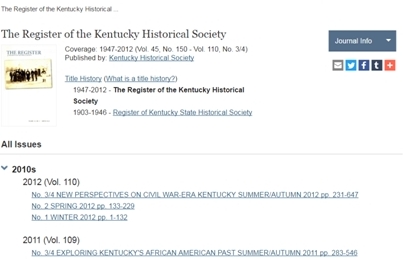
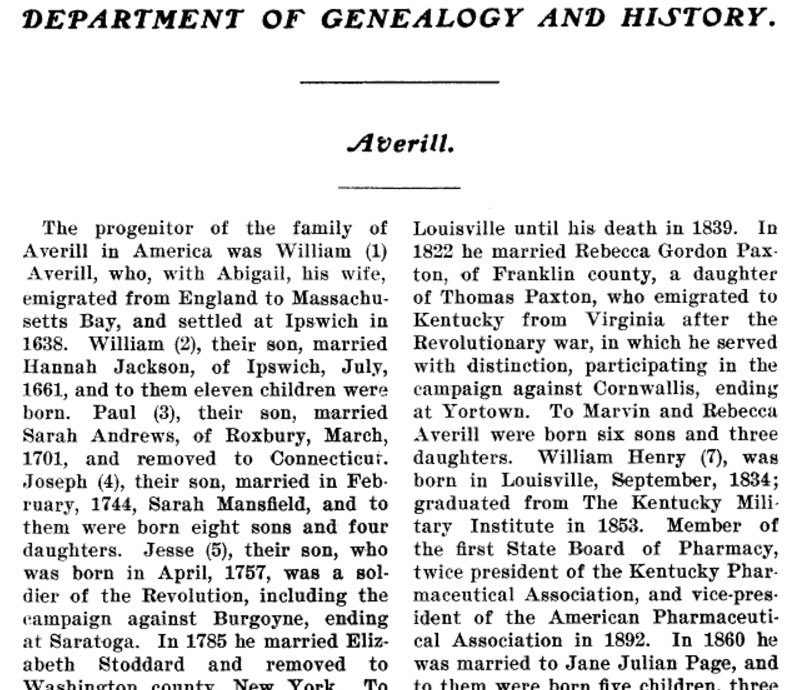 Within your profile, you can create lists of articles to help organize your research. You might be doing research on the Averill family and want to put all the articles you find on that name into one list. Or you might want to group things by subject: “Huguenots.”
Within your profile, you can create lists of articles to help organize your research. You might be doing research on the Averill family and want to put all the articles you find on that name into one list. Or you might want to group things by subject: “Huguenots.”
JSTOR makes some content free to all and other content is limited based on the license agreement with the publisher. JSTOR has a category of publications called Early Journal Content, which makes nearly 500,000 public domain articles from more than 200 journals freely available to the public on the JSTOR platform. Early Journal Content includes U.S. content published before 1923 and non-U.S. content published prior to 1870. When you do a search, the results will tell you what you have free access to and what you would need to pay for (but you get the full citation.)
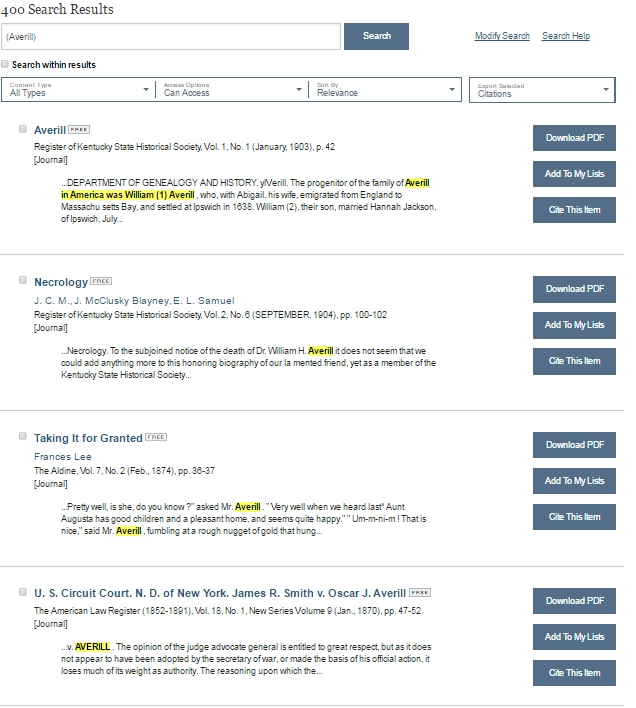
In summary, JSTOR is a tremendously powerful resource for any research project. Genealogists can and should use this tool to get at historical content in journals of all kinds. And most state history journals published a huge amount of family history in their early years.
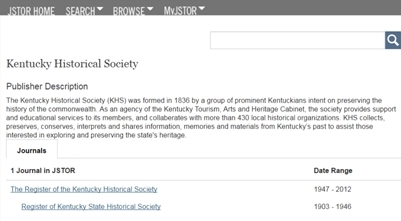
Awesome resource.